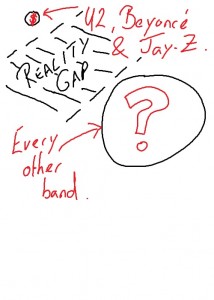Ladies and gentlemen, we have reached the nadir. Push marketing of music can go no lower.
Last week U2 and Apple, under cover of hype, conspired to Like Santa, if he chose to deliver only one gift to everyone, regardless of the diversity of their pleading letters.
Listeners get new music. Apple gets renewed audio impetus. U2 gets global exposure. Win-win-win, no?
No.

Somewhere, Over ‘In Rainbows’
Most folks are looking this gift horse squarely in the mouth, with a steely gaze that says it’s time to make glue.
For every delighted fan there appear to be many more reports of spam, leaving Apple to back peddle somewhat and announce a U2 removal tool to rid iTunes accounts of the intruding album. While a part of me feels a pang of sympathy for a renowned band trying to find its way into the ears of a new audience, my remainder screams “messiah marketing gone too far.”
And the cynical side would be right.
For all those who thought the pay what you want experiment of Radiohead’s “In Rainbows” undermined the value of music, this is your new low; an album so stripped of its inherent value that it achieves junk mail status to the majority of recipients. Of course U2 got paid for the whole stunt by Apple, and their back catalog has seen the expected bump in sales on iTunes as a result, but for the wider sphere of artists the album as a piece of work worth paying for has perhaps heard its final death knell.
If one of the most recognized bands in the world is giving a full set away, why would anyone pay for a smaller band’s collection of songs?
Well some will, and they will always form the core of any artist’s fan base, but they’re no longer the norm and this isn’t a new situation.
The current climate has been building for years, as digital downloads liberated the single and unlimited streaming services made playlists the go-to tool for extended listening sessions. The value of music hasn’t so much been decimated as it has redistributed, meaning that artists need to know where to look to soak up new revenue streams.
Look to online ads. Look to associations with other creative partners. Just don’t look to the older artists desperately trying to squeeze blood from a stone.
Push No More
 If any doubt remained that music can no longer be battering rammed into the listener’s brain, this should extinguish it. We’re overwhelmed by choice and underserved by time, leaving little opportunity to sample fresh songs and only the slightest space to pull in the new that we love.
If any doubt remained that music can no longer be battering rammed into the listener’s brain, this should extinguish it. We’re overwhelmed by choice and underserved by time, leaving little opportunity to sample fresh songs and only the slightest space to pull in the new that we love.
With push marketing having run its course for all but the biggest artists, smaller acts are left to navigate the more complex world of pull marketing; being so alluring and/or ubiquitous that the music becomes unavoidable. It’s back to classic word of mouth marketing, the subtle art of being everywhere without being intentionally in your face.
The rules of U2 – and Beyonce and Led Zeppelin and Jay Z before them – are not those of today’s rising artists.
The game has changed and these acts are playing their last few hands before slipping out of the popular spotlight. There won’t be another flash holiday release, because it’s been done. And Samsung won’t stump up another $5 million to release an album on its newest device, because that’s been done as well. And none of these tactics matter to the little guy anyway, because they can’t be replicated at any level other than superstardom.
When your local band releases a surprise album, the only surprising element is that they expected anyone other than hardcore fans to pay attention. With the best will in the world, and a burning desire to see new bands succeed: We. Have. No. Time.
Unless you come highly recommended, of course. If we trust the source or catch your creativity ourselves, then you’ve made the breakthrough. That means making your music available and ready to listen when a potential new fan finally comes calling. Be everywhere, be engaging, and be on the radar of influencers who make it their business to spread new songs that they love.
Most importantly, it means not pushing harder every time like the legacy artists you’ll never emulate, but instead being everywhere and inching into our ears with each subsequent spin.
Let the listener find you and be eager to explore every avenue that you’ve made available, audio, video, and any other medium you can exploit. The fan relationship will be all the better for it, and no-one will be forced to develop an app specifically to get you out of my music library.




 Pros:
Pros: